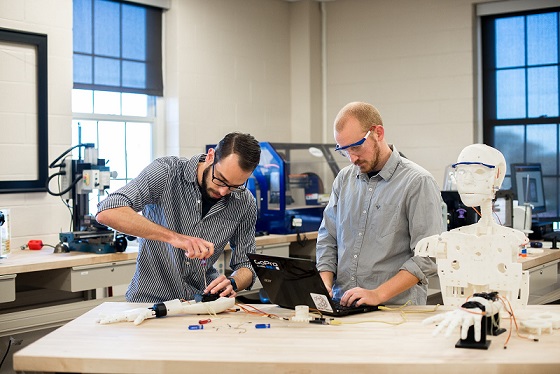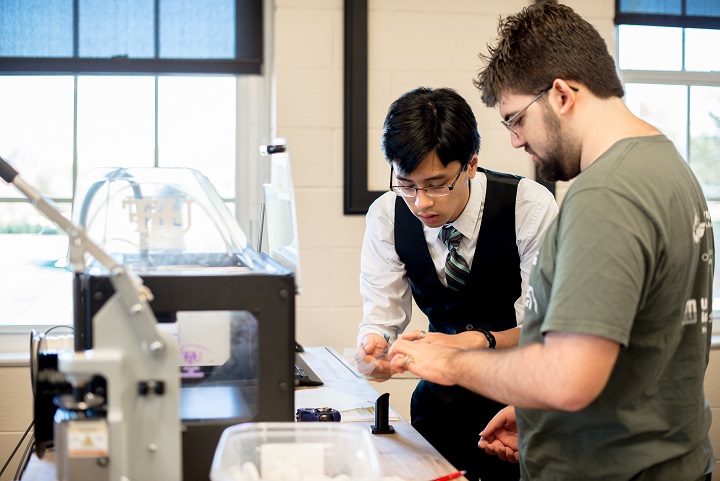Resource:How to utilize faculty and other resources on campus for successful interdisciplinary and entrepreneurial work
Contents
Introduction
“Breakthrough innovation occurs when we bring down boundaries and encourage disciplines to learn from each other”
― Gyan Nagpal, Talent Economics: The Fine Line Between Winning and Losing the Global War for Talent
In order to have a healthy entrepreneurship ecosystem on campus there needs to be collaboration between the different colleges. A successful startup requires a wide variety of skills to not only be able to create a working product, but create a product that people want to use. In order to support this, students and faculty need to effectively use all of the resources available at their disposal.
We talked to Abby Collins from Tennessee Tech University, she is a current UIF and has been very involved in getting her university to invest in new initiatives to encourage I&E. To get this to happen she had to use a variety strategies when approaching her administration and working with them.
Needs and Goals
Setting goals and timelines for interdisciplinary and entrepreneurial work helps one stay on task. Often setting smaller goals within the ultimate goal for the endeavor eases and prioritizes the workload.
In order for students to work together on interdisciplinary projects there needs to be a pipeline for building and supporting those connections. You need to have faculty and administrators invested in supporting classes or regular projects that students know will exist regularly. Regularity is important because it helps build a reputation and a community around that pipeline, providing new students even more support.
Introducing potential and new students to interdisciplinary and entrepreneurial programs, classes, and clubs during campus visits and orientations is important for informing students with such interests.
Students of every major can benefit from interdisciplinary work. Classes that blend various majors together have the potential to create, innovate, and problem-solve areas that are overlooked when only one type of mindset is in the classroom. For example, the Chemical Engineering and Nursing class at Tennessee Tech uses students strengths in their different fields to create medical devices. These students must present their product and work to ensure that a built prototype would work. Entrepreneurial skills are laced throughout the coursework and strengthen students’ skills. Setting the bar for campus’ interdisciplinary work is imperative to the effective collaboration of students and their preparedness for future work.
Support
Establishing connections both on and off campus is vital for interdisciplinary and entrepreneurial work to succeed. Creating a network of on-campus connections allows for increased involvement when working on both current and future endeavors.
The support system will be build of a set of “friendly” student organizations, faculty, administrators, and businesses. It’s entirely possible that although students may be prevented from accessing a resource via one avenue, they may be able to access it in another (such as getting to use a 3D printer in one department instead of another). It’s important to build a support network that can work with in a symbiotic manner. However, it’s also necessary to give back to those who gave their support. If it’s only a one way relationship, supporting partners will be less likely to help in future endeavors.
Below are some creative ideas as to how you can build relationships:
- Student Organizations: Generally working together on events is a good starting point.
- Faculty: Giving them opportunities to talk about their research, finding them good student researchers, and helping them find a way to commercialize their research can all be options (depending on the person).
- Departments: Generally it helps to host “high profile” events that make the department look better, students can also (in some cases) help them solve key problems of their own using an innovative solution. Either of these will build mutual respect.
- Businesses: Working with them to host events, helping them find employees or interns, or even in some cases pitching a successful solution to one of their core problems can help build a relationship with businesses.
The general idea is to provide something for the other member of the ecosystem resulting in receiving a buy-in from them. Ultimately, students need a support network to make plans succeed in the long-term.
Cost
Generally initiatives fall into two categories, either being started by students or the administration. They sometimes overlap, but not always.
Student Initiative
Student-run programs and events focused on entrepreneurship have to be more creative in terms of dealing with funding issues. Students can use a combination of the following strategies.
Partnering with businesses should definitely be something that gets examined as an option, both in terms of getting money or getting a discount on something like pizza. Many businesses are happy to give a discount if they think it provides an opportunity to get a reliable customer. This sort of deal can sometimes be in exchange for having promotional material say “supported by X business”.
Partnering with other organizations to share the cost of an event can be very helpful. Especially if one group is the one bringing in a speaker, it can be a fair trade to have another organization foot part of the bill.
Going to different departments and asking for funding (if it’s an event or program that would benefit the department) can work if students have a good argument for the benefit to the department.
Administration Initiative
If a program is being paid for by the administration you don’t need to worry about having enough money nearly as much, and you can find additional funding using the same methods as you would for a student initiative (although make sure you check with admin before agreeing to advertise for a business in association with the event).
One additional thing to think of is that if you can save the university money it can bring good will back to the student organizers. Student organizers have been able to halve the costs of food catering (while keeping a high quality), and this helped them later get funding for their own events.
Leadership
In order to reach multiple branches of disciplines, and be able to create a plan to introduce and teach students entrepreneurial skills, a group of leaders on that campus is beneficial, and in most cases, necessary. These leaders need to reach out to faculty while also getting “all of the right people” in the room in order to see successful results in interdisciplinary and entrepreneurial work. Apply leadership skills towards approaching faculty in a respectful and objective manner. Often times, it will take multiple meetings and conversations to reach a goal.
Begin by developing a relationship with the most cooperative and supporting faculty that will backup goals and ideas in the early stages. This leads to smoother transitions towards successful interdisciplinary and entrepreneurial work. Both students and faculty recognize key leadership qualities such as negotiation and mediation skills, so prepare to be flexible with needs and goals, while holding ground on the premise of the interdisciplinary or entrepreneurial work. Along the way, keep in contact with individuals met throughout the process, because those connections that will be of future benefit.
Lessons Learned and General Tips
In summary, it takes a combination of strong relationships and drive to get the necessary resources on campus. Not taking no for an answer the first, second, or even fifth time can work as long as it is done in the right way. Other community members need to feel like they are being considered and respected if they are going to contribute time and money to a program. Student leaders need to have patience when working with faculty who are wary of change, and sometimes it takes approaching a problem from multiple avenues to get the necessary result.
The UIF our team interviewed, Abigail Collins, informed us about the iCube at Tennessee Tech University, which promotes interdisciplinary and entrepreneurial work and collaboration. Here is an awesome video to encapsulate what the iCube has to offer students.


